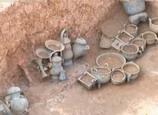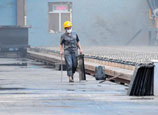
 |
| Some houses have already been demolished for the construction of fire access passage, according to the local government. Photo: Zhang Zhilong/GT |
Divided opinions
The government plans have not been rejected entirely by those who are directly concerned.
When asked by the Global Times what they would do if their old houses are demolished, most people seemed to care more about what kind of new houses they would get instead of the fate of their current homes.
"So long as the living conditions are better than now, I'm willing to leave," said a middle-aged woman surnamed Ning, who has lived in the old street for over 20 years. She rents two rooms and a kitchen in an old house, which accommodates about 10 families in total according to Ning.
She said that most residents living in the old houses are elderly who are used to being here but that young people prefer modern homes.
Other residents complained about sub-par sanitation and roof leaks, adding that they were not too bothered about the fate of the old houses. About half of the residents rent rooms directly from the local government, for only 1 yuan per square meter per month.
"The construction of fire access passages is necessary, and so is demolition to certain extent," Ruan Yisan, a well-known expert on the protection of ancient buildings at Tongji University, told the Global Times.
But the condition of such demolitions must be based exactly on the set plans by professional experts, Ruan emphasized.
It's understandable that local governments want to develop tourism by protecting ancient buildings, but the question is how best to protect these elements, Ruan said.
He warned that there are stated rules for rebuilding old houses, and that they should be followed to the letter.
As far as Huang is concerned, the local government should be cautious. He advises that the old street should be rebuilt to look as it did before, not as a commercial showcase of fake relics.
"The value of the old street will be far greater in years to come if done properly, instead of being altered forever for nothing more than a temporary financial boost," Huang declared proudly.
Other examples
The old street in Lichuan is lucky compared with many others in China which have disappeared completely as the country is "modernizing" itself by demolishing old buildings.
In Baishazhou, Hubei Province, over 20 houses that were older than Lichuan were demolished in 2004. The old street, almost a kilometer long, was left in ruins.
The real estate developer saw no wrongdoing, believing these relics did not deserve to survive, a view likely shared by local officials.
What happened in Baishazhou is fairly typical. Many old streets are demolished before their value is realized either by the local government or by their residents. They do not possess the official status of cultural relics and thus have no protection against demolition.
The destiny of Taohuawu in Suzhou, Jiangsu Province is similar to that of Baishazhou. In the name of "protecting and making use" of relics, many old buildings in Taohuawu were demolished in 2012.
Not all examples are horrid though. The towns of Wuzhen in Zhejiang and Zhouzhuang in Jiangsu have become known for having had their traditional styles well-preserved. Which model the Lichuan government will follow remains to be seen.

















 Quadruplet sisters and their family
Quadruplet sisters and their family


![]()
